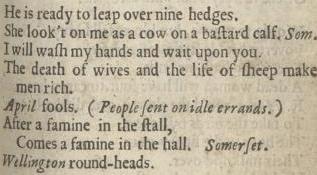By Mike Sutton
There are many competing explanations for the cultural origins of April fools day.
Wikipedia has it that: “In 1508, French poet Eloy d’Amerval referred to a poisson d’avril (April fool, literally “April fish”), a possible reference to the holiday. In 1539, Flemish poet Eduard de Dene wrote of a nobleman who sent his servants on foolish errands on 1 April. In 1686, John Aubrey referred to the holiday as “Fooles holy day”, the first British reference. On 1 April 1698, several people were tricked into going to theTower of London to “see the Lions washed”.”
Today, April 1st 2015, no joke, honestly, with the ID research method, I found what appears to be the first English use of the term “April fools”:
“April fools – People sent on idle errands.”
Source:Ray, J. (1678) A Collection of English Proverbs. W, Morden, Cambridge University.
F. Ray is described as being a Fellow of the Royal Society. From his work, including a book on birds and another on poisons he appears to have been something of a polymath.
To find out how to find early uses of terms, phrases and words with the remarkable ID method – see first free chapters of Nullius in Verba



